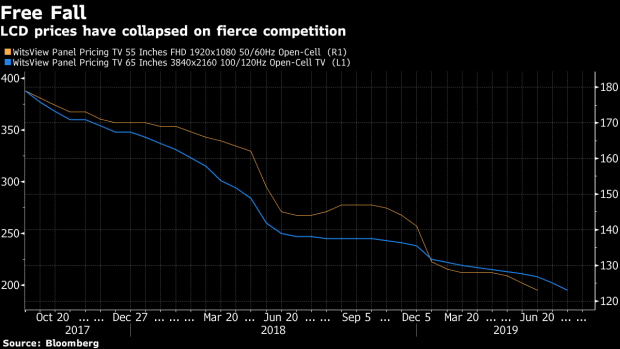Oct 9, 2019
Samsung Is Pouring $11 Billion Into Next-Generation Displays
, Bloomberg News

(Bloomberg) -- Samsung Display Co. plans to spend 13.1 trillion won ($11 billion) developing and building next-generation displays, responding to a flood of supply and price pressure from fast-moving Chinese rivals.
In an announcement event attended by Korean President Moon Jae-in and Samsung Electronics Co. Vice-Chairman Jay Y. Lee, the investment was presented as a move to reorganize the display industry while maintaining Samsung’s global lead and Korea’s established dominance. The government will invest about 400 billion won into next-generation displays to propel that objective, Moon said.
Samsung and cross-town rival LG Display Co. are grappling with a surge of competition from Chinese suppliers such as BOE Technology Group Co., which in recent years have ramped up liquid crystal display-making capacity and are increasingly making inroads into next-generation screens. To offset a decline in margins and loss of clients, Samsung is moving forward with development of quantum-dot organic light-emitting diode, or QD-OLED, displays. An improved version of the state-of-the-art OLED panels that Samsung is expert at, QD-OLED promises wider color gamut, better efficiency and a higher quality of output.
Samsung’s heir and de-facto leader Lee has pledged to invest for the long-term in the display business, which is one of the three main pillars -- alongside memory chips and smartphones -- in which the Korean tech champion is world leader. The company is making a huge bet on the market as the business environment deteriorates and a trade spat between Korea and Japan creates uncertainty around the supply of chemicals and components necessary to manufacture advanced displays. This week, Samsung reported a quarterly profit decline of more than 50%, though that was less of a fall than anticipated.
Read more: Samsung Beats Estimates as Demand Picks Up for Note, IPhone
Korea’s largest company is the world’s foremost producer of high-margin OLED displays, but hit a snag last year when orders from Apple Inc. underwhelmed after the marquee iPhone XS fared worse than expected. It remains to be seen how enticing the new iPhone 11 Pro models will be to consumers over the critical holiday shopping season, though analysts are growing optimistic on demand.
Away from displays, the unpredictability surrounding tensions between the U.S. and China -- where Samsung earns a big chunk of revenue -- has led to a downturn in the chip industry at a time when smartphone demand tapers off and the pace of data center construction decelerates.
To contact the reporter on this story: Sohee Kim in Seoul at skim847@bloomberg.net
To contact the editors responsible for this story: Peter Elstrom at pelstrom@bloomberg.net, Edwin Chan, Vlad Savov
©2019 Bloomberg L.P.





